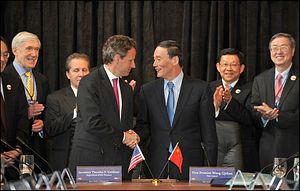The U.S. Government Accountability Office (GAO) has called for stricter oversight on already negotiated trade deals with China. In a report issued Tuesday, GAO noted that China has made nearly 300 trade and investment commitments to the U.S., with 184 coming from the U.S.-China Joint Commission on Commerce and Trade (JCCT) and 114 from the U.S.-China Strategic and Economic Dialogue (S&ED). However, GAO noted that there are discrepancies and disagreements within U.S. agencies in charge of tracking implementation of these commitments. As a result, GAO recommended that “the U.S. Trade Representative, in conjunction with the Secretary of Commerce and the Secretary of the Treasury, should work to provide clearer and more comprehensive reporting on the status of China’s implementation of its JCCT and S&ED trade and investment commitments.”
The trade commitments noted in the report were concentrated in a few areas, including intellectual property rights, technical and regulatory trade barriers, and sector-specific issues (with pharmaceuticals, software, and agriculture being the top three targets). The GAO report casts a practical light on the wave of agreements that inevitably follow the JCCT and S&ED, noting that few commitments have concrete timetables or standards for evaluation.
In addition, the GAO noted that there is no comprehensive report tracking China’s follow-up to its trade commitments. According to GAO, this “makes it difficult for Congress and other stakeholders to fully understand the progress the United States is making in reducing trade barriers.” As a result, the GAO recommended that relevant agencies provide more clear and comprehensive information to external parties, including Congress.
According to the opening letter included in the report, GAO’s investigation stemmed from a request for more information by Rep. Dana Rohrabacher (R-CA), Rep. Frank Wolf (R-VA), and Rep. J. Randy Forbes (R-VA). Members of Congress have been loudly expressing their concerns about China of late, including at a recent House of Representatives hearing on China’s maritime disputes. Congress traditionally leaves most foreign policy-making to the White House, but when Representatives and Senators do express opinions on foreign relations, they can be hawkish and confrontational.
Trade issues have continually been a major part of U.S.-China relations, but as a whole trade relations form the bedrock of the relationship. U.S.-China bilateral trade was worth over $562 billion in 2013, with the U.S. running a $318 billion trade deficit (making the deficit itself a pet issue of many a U.S. politician). The massive amount of bilateral trade is one reason conventional wisdom has it that U.S.-China relations will never deteriorate past a critical level.
While there are long-standing disagreements over issues such as intellectual property rights, trade barriers, and the value of China’s currency, U.S. administrations generally focus on the positives, outlining the progress made in economic relations. Commitments such as the ones GAO investigated are an important part of the way the executive branch frames its narrative on China. The request for a report from GAO indicates that some members of Congress are increasingly skeptical about the conventional narrative of U.S.-China trade relations.

































